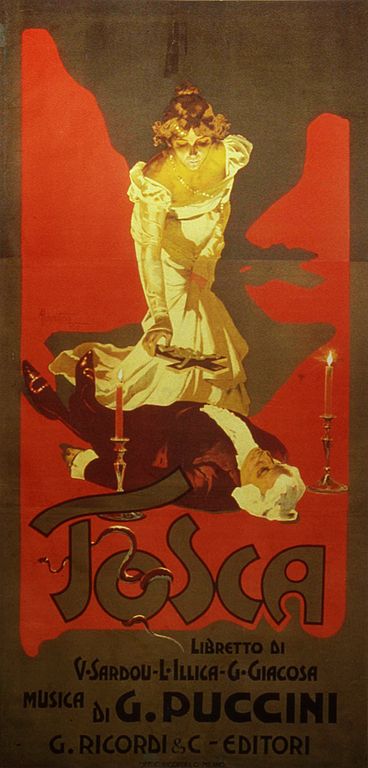Puccini, Vissi d’arte (from Tosca)
Giacomo Puccini (1858-1924) can claim several operas as being among the most frequently performed, La Bohème in particular. Within his operas are several arias that are among the most famous, Nessun dorma from Turandot in particular. Vissi d’arte from Tosca qualifies on both counts even though it may be less well known among the general public.
Puccini combined close attention drama with strong and luxurious melodies. Puccini’s arias often retain a chant-like declamatory style (somewhat reminiscent of recitative) while the melody is carried by the orchestra. But then voice and orchestra come together in great emotional climaxes.
Like all born musical dramatists, Puccini concentrated into a single phrase all there was to express at a given point of the drama, thus achieving a close union of words, sentiment and situation—hence the irresistible impact of the Puccinian cantilena has on the listener. —Groves Dictionary of Music and Musicians
 To illustrate, in the video below, compare what happens from 1:00 to 1:30 with the ensuing ten seconds (1:30-1:40).
To illustrate, in the video below, compare what happens from 1:00 to 1:30 with the ensuing ten seconds (1:30-1:40).
The opera is set in Rome in 1800 amid the turmoil of Napoleon’s conquest of Italy. Napoleon is, for a second time, knocking on the door and the chief of police, Scarpia, is hunting Angelotti (aligned with Napoleon). Tosca, a singer, gets pulled into this drama when her boyfriend Cavaradossi helps to hide Angelotti. At this point in the opera, Scarpia is torturing Cavaradossi and pursuing Tosca. He promises to release Cavaradossi if Tosca will submit. So Tosca is at a decision point in this aria. The knife (2:12) will reappear shortly with Tosca’s decision and the famous line, “This is Tosca’s kiss.”
Here is the English translation:
I lived for my art, I lived for love,
I never did harm to a living soul!
With a secret hand
I relieved as many misfortunes as I knew of.
Always with true faith
my prayer
rose to the holy shrines.
Always with true faith
I gave flowers to the altar.
In the hour of grief
why, why, o Lord,
why do you reward me thus?
I gave jewels for the Madonna’s mantle,
and I gave my song to the stars, to heaven,
which smiled with more beauty.
In the hour of grief
why, why, o Lord,
ah, why do you reward me thus?
Although I recommend watching the entire opera, you should know that this Met production included a needlessly explicit scene to show Scarpia’s lascivious nature. Find a more traditional production if you intend to show it to your kids.



